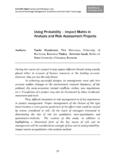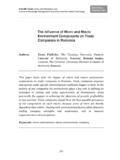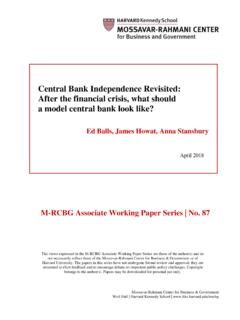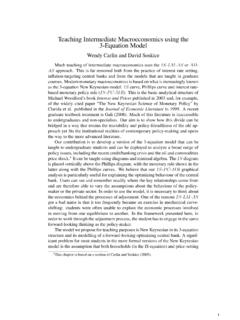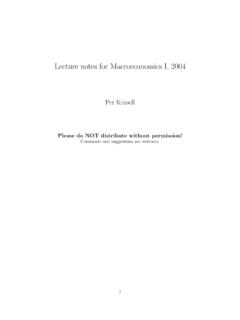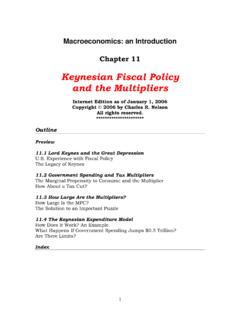Transcription of Monetary Policy and Economic Policy
1 Monetary Policy and Economic Policy Iordachioaia Adelina-Geanina, Titu Maiorescu University, Romania Abstract There is widespread agreement that Monetary Policy matters,but there is disagreement about how it should be conducted. Behind this disagreement lie differences in theoretical understandings. The paper contrasts the New Classical, Neo-Keynesian, and Post-Keynesian frameworks, there by surfacing the differences. The New Classical model has Policy only affecting long run inflation.
2 The Neo-Keynesian has Policy impacting inflation, unemployment , and real wages. The Post-Keynesian model also impacts growth, so Policy implicitly picks a quadruple. Inflation targeting is a sub-optimal Policy frame because it biases decisions toward low inflation by obscuring the fact that Policy also affects unemployment ,real wages,and growth. Keywords: Monetary Policy , inflation targeting, New Classical , Neo-Keynesian, Post- Keynesian Introduction Monetary Policy involves changes in the base rate of interest to influence the rate of growth of aggregate demand, the money supply and ultimately price inflation.
3 Monetarist economists believe that Monetary Policy is a more powerful weapon than fiscal Policy in controlling inflation. Monetary Policy also involves changes in the value of the exchange rate since fluctuations in the currency also impact on macroeconomic activity (incomes, output and prices) Changes in short term interest rates affect the spending and savings behaviour of households and businesses over time and therefore feed through the circular flow of income and spending. The transmission mechanism of Monetary Policy works with variable time lags depending on the interest elasticity of demand for different goods and services the demand for interest-sensitive consumer goods and services bought on credit or the demand for capital investment from private sector businesses.
4 Because of the time lags involved in setting an appropriate level of short-term interest rates, the Bank of England sets nominal interest rates on the basis of hitting the inflation target over a two year forecasting horizon. Theory Monetary Policy is the process by which the government, central bank, or Monetary authority of a country controls the supply of money, availability of money, and cost of money or rate of interest to attain a set of objectives oriented towards the growth and stability of the theory provides insight into how to craft optimal Monetary Policy .
5 Monetary Policy rests on the relationship between the rates of interest in an economy, that is the price at which money can be borrowed, and the total supply of money. Monetary Policy uses a variety of tools to control one or both of these, to influence outcomes like Economic growth, inflation, exchange rates with other currencies and unemployment. Where currency is under a monopoly of issuance, or where there is a regulated system of issuing currency through banks which are tied to a central bank, the Monetary authority has the ability to alter the money supply and thus influence the interest rate (to achieve Policy goals).
6 It is important for policymakers to make credible announcements. If private agents (consumers and firms) believe that policymakers are committed to lowering inflation, they will anticipate future prices to be lower than otherwise (how those expectations are formed is an entirely different matter; compare for instance rational expectations with adaptive expectations). If an employee expects prices to be high in the future, he or she will draw up a wage contract with a high wage to match these prices.
7 Hence, the expectation of lower wages is reflected in wage-setting behavior between employees and employers (lower wages since prices are expected to be lower) and since wages are in fact lower there is no demand pull inflation because employees are receiving a smaller wage and there is no cost push inflation because employers are paying out less in wages. To achieve this low level of inflation, policymakers must have credible announcements; that is, private agents must believe that these announcements will reflect actual future Policy .
8 If an announcement about low-level inflation targets is made but not believed by private agents, wage-setting will anticipate high-level inflation and so wages will be higher and inflation will rise. A high wage will increase a consumer's demand (demand pull inflation) and a firm's costs (cost push inflation), so inflation rises. Hence, if a policymaker's announcements regarding Monetary Policy are not credible, Policy will not have the desired effect. If policymakers believe that private agents anticipate low inflation, they have an incentive to adopt an expansionist Monetary Policy (where the marginal benefit of increasing Economic output outweighs the marginal cost of inflation); however, assuming private agents have rational expectations, they know that policymakers have this incentive.
9 Hence, private agents know that if they anticipate low inflation, an expansionist Policy will be adopted that causes a rise in inflation. Consequently, (unless policymakers can make their announcement of low inflation credible), private agents expect high inflation. This anticipation is fulfilled through adaptive expectation (wage-setting behavior);so, there is higher inflation (without the benefit of increased output). Hence, unless credible announcements can be made, expansionary Monetary Policy will fail.
10 Announcements can be made credible in various ways. One is to establish an independent central bank with low inflation targets (but no output targets). Hence, private agents know that inflation will be low because it is set by an independent body. Central banks can be given incentives to meet targets (for example, larger budgets, a wage bonus for the head of the bank) to increase their reputation and signal a strong commitment to a Policy goal. Reputation is an important element in Monetary Policy implementation.
